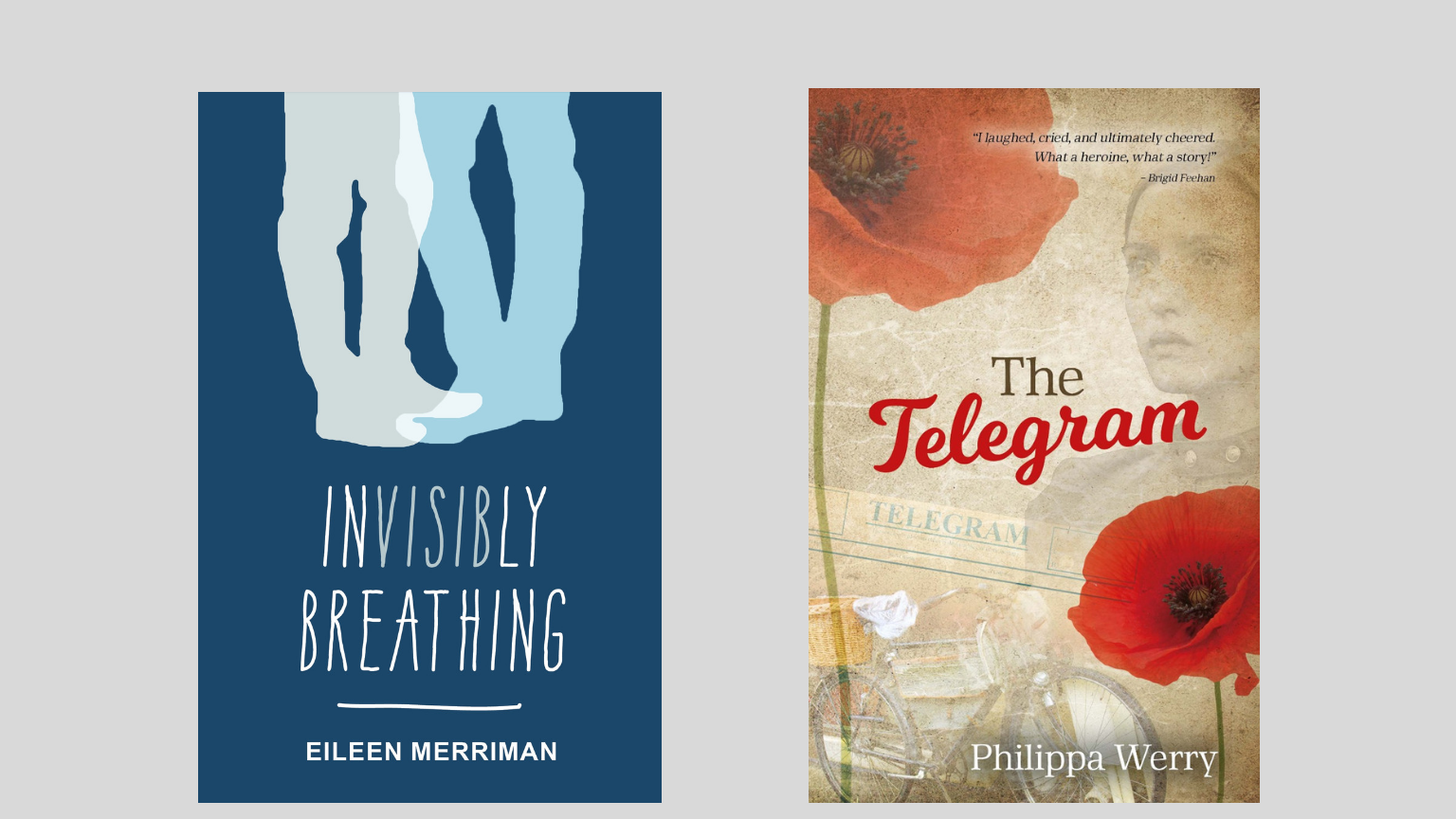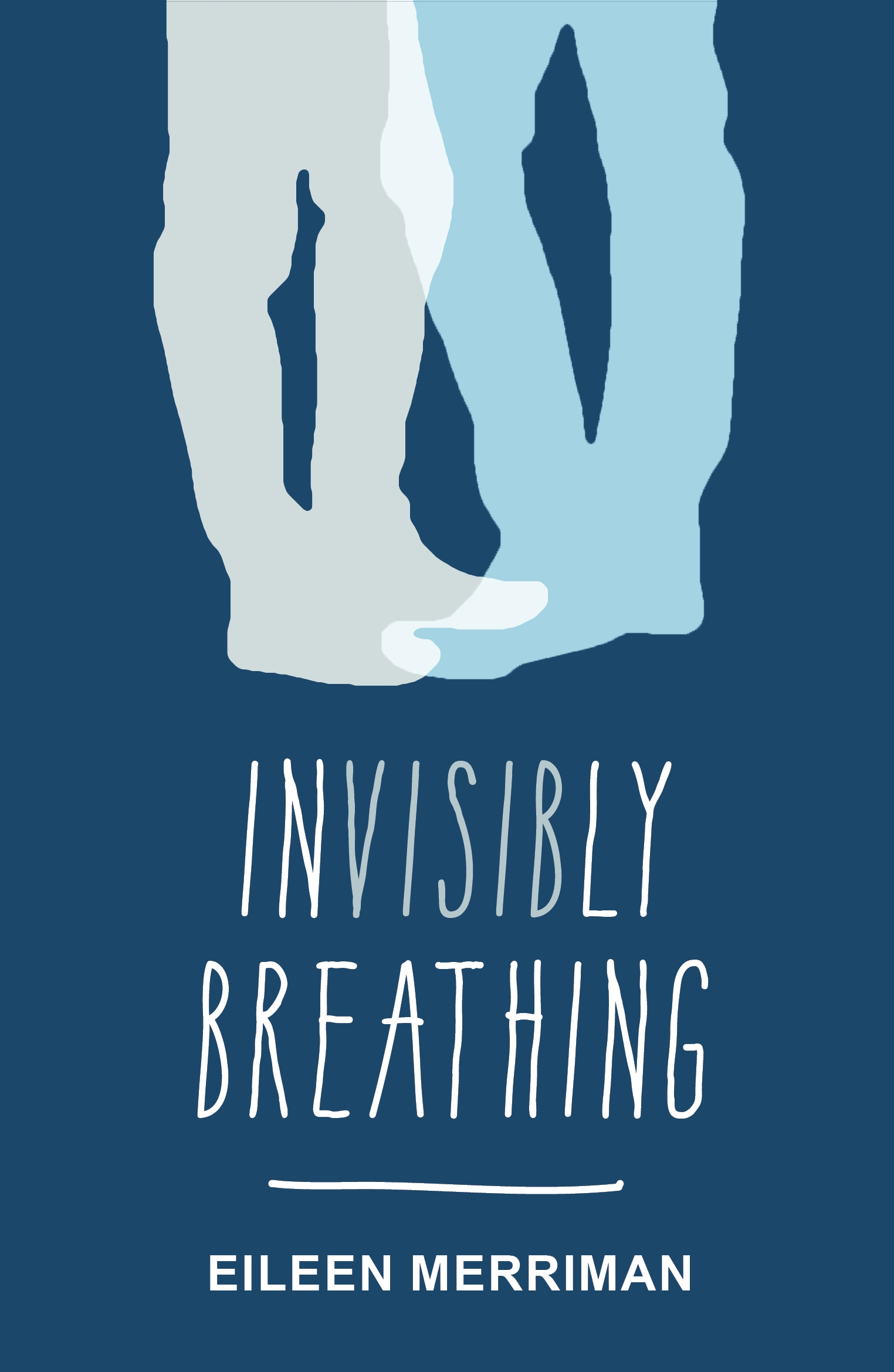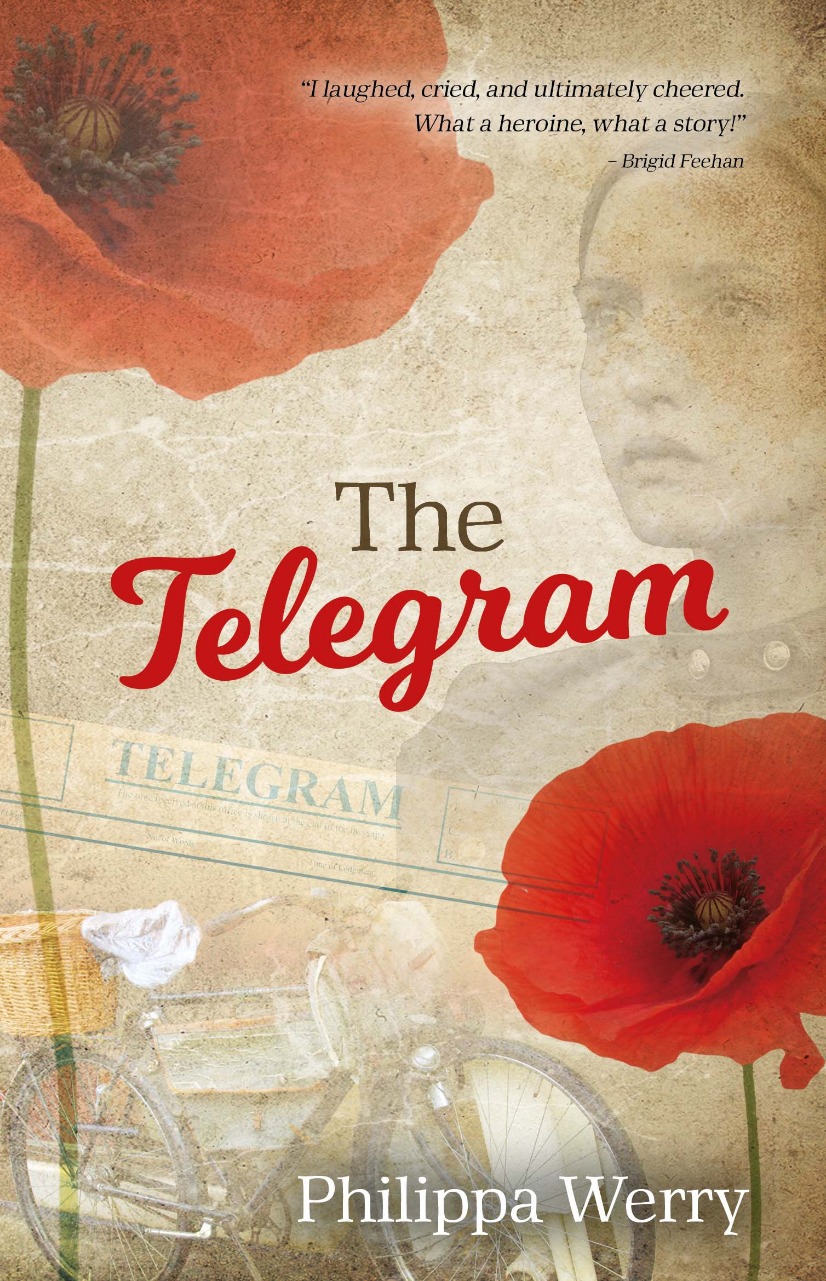Sarah Forster reviews another fantastic YA book by Eileen Merriman, and a book by Philippa Werry telling a WW1 story from the perspective of a 14-year-old girl at home, working as a telegram delivery girl. Both books are well-written and highly recommended.

Invisibly Breathing, by Eileen Merriman
How on Earth is Eileen Merriman writing a book a year and making each one better than the previous one?! This tale of two troubled 16-year-olds finding in each other an oasis from everyday chaos is extremely well-executed. The story is told in alternating voices, and it is smoothly done – you never lose sense of time passing. In fact, it is so well done I ignored my family and finished it in a matter of hours.
Felix Catalan isn’t exactly the most popular boy at school. He finds beauty in mathematics and physics, and thinks in sequences, to help him cope with a rocky home life. No diagnosis is mentioned, but his actions show he has obsessive-compulsive tendencies. He isn’t great at small talk (which I can relate to), but the friends he does have are loyal. Just as his loving but dysfunctional parents split up, he meets Bailey Hunter, who has recently come to his Lower Hutt school from West Auckland.
Just as his loving but dysfunctional parents split up, he meets Bailey Hunter, who has recently come to his Lower Hutt school from West Auckland.
Bailey is homesick for Auckland, and counting down the days until he can return for uni, where he plans to study law. He has four younger siblings, and an alcoholic father, who regularly uses him as a punching bag. When he left his life in Auckland, he had just split with a girlfriend because he admitted he cheated on her with another guy.
‘I’m at one end of the line and Felix at the other, but I can still feel the calluses on his palms, can still hear the way his breathing sped up when I pulled him towards me. I can’t believe this is happening again.’
Is Bailey the first bisexual person in New Zealand mainstream YA? I think this may be the case. How ridiculous is that – and how awesome is Merriman for changing it. LGBTI+ teens are few and far-between in our national literature, and if we are to see a change in the way they are perceived, this needs to change.
Is Bailey the first bisexual person in New Zealand mainstream YA? I think this may be the case. How ridiculous is that – and how awesome is Merriman for changing it.
So the boys meet, they fall in love – but the course of true love never runs smooth. For Felix, Bailey is the light. He is the first boy he’s ever been with, though he has known he was gay for awhile, and in secret puts on his mum’s makeup to play Green Day on his guitar. For Bailey, Felix represents the other side of the tracks as well as something pure and wonderful. He is afraid of what his father might do if he ever finds out, with good reason.
The book’s plot is reasonably straightforward, with the driving narratives focussing on Bailey’s home life and for Felix, bullying from a person at school. I think, as with her other two books, the emotional truth is what really pulls the reader in. As I read this, I could see that she had been reading other YA authors who have tackled this type of love story, and put her own twist on it. I was reminded a little of Patrick Ness’ Release, and also a bit of Jennifer Niven’s work.
I think, as with her other two books, the emotional truth is what really pulls the reader in.
There is still a lot of fear for teens coming out now. It shouldn’t be the case, but it is. Small minds at school, or at home, or just uncertainty, means kids sometimes feel trapped in a life that is not their own. This is compounded by the use of social media, which becomes a theme in this book in a revenge-plot-gone-wrong that ends up outing both boys. Or does it?
Merriman has a knack for keeping those pages turning, with short, snappy sentences and perfectly pitched chapter endings. The ending is fast-paced and explosive – and very satisfying.
I recommend this for any teen who enjoys contemporary love stories, and books set in their own reality. Age 13+ – there are sex scenes but they aren’t terribly detailed; there is a lot of domestic violence, however, and it can be shocking.

The Telegram, by Philippa Werry
‘Mrs Fletcher was there too. She was famous for having sent six of her eight sons to war… People admired her, as if she was a living monument, but they kept their distance. She was lucky because she had eight sons. She was unlucky because six of them had gone off to war… Who knew when her luck would turn?’
Beatrice (Beaty) is 14, and as she returns from school at the start of the book, she realises something is wrong: her own mum is already home. Her mum has lost some hours in her job as a seamstress, which she’s had since her husband died some years after the Boer War. Beaty has to stop going to school, and thanks to a friend of her father’s, she learns about a job as a telegram delivery ‘lad’ going at the local post office. Beaty knows this won’t be easy, and she doesn’t know if she wants to do it; but the household, her mother and sister, need the money she will bring in.
This is the first time I have read a book of fiction about the work that women did at home during World War I; and certainly the first time I have been in the shoes of the one person that nobody wants to see at their doorstep: the bearer of bad news. I cried, I flinched, I sympathised with Beaty as she went about her rounds delivering her telegrams.
I cried, I flinched, I sympathised with Beaty as she went about her rounds delivering her telegrams.
Beaty as a character is extraordinary: Werry has drawn her so expertly that you know her motivations, and her passions as well as you do those of your best friend. The story is told in the first person by Beaty, who, mindful of being denied her education, is also learning Morse Code when not working.
Beaty has a neighbour, Caleb, at war – he is the brother of her best friend, and we find out what the war is like first-hand thanks to Caleb’s letters to Beaty. They are letters of a friend, someone who knows Beaty is the only person they know who can deal with these types of hard truths. But she doesn’t find it easy. ‘I don’t want anyone to think I’m the sort of person who delivers a telegram and goes off, whistling. At night, when I can’t sleep, they pass in front of my burning eyes, staring at me wordlessly from open doorways…’
She has one outlet – she is invited to join the church choir. Despite not being able to sing, she goes along, and feels unexpectedly light: for once, she wasn’t the bearer of bad news. She was just part of the choir.
‘People talked about losing someone like they talked about Daniel losing his leg, as if it was their own fault, being careless, but it wasn’t, of course. It was guns and shellfire and gas.’
‘People talked about losing someone like they talked about Daniel losing his leg, as if it was their own fault, being careless, but it wasn’t, of course. It was guns and shellfire and gas.’
Something I wonder why exactly it is we insist on reading and writing books talking about the war. We are at the end of a long five years of war publishing, thanks to the WWI centenary. Something that this book shows, better than any others of the ones aimed at children that I have read, is the true human cost of war. You cannot read it and come out with the takeaway that it was all a glorious adventure from the perspective of those at home. Thank goodness for that.
Beaty’s war story, and that of her town, does not end on Armistice Day. After a day where she observes, ‘A good, waiting-for-something feeling. Like buds coiled on the trees, waiting to uncurl and spread colour along the bare branches,’ she delivers the precious telegram to the Mayor, then attends the parade, and hears coughs and sneezes around her. She keeps on delivering telegrams – many men died on the final day of the war, not knowing it was all over. And her mother and she begin another hard job, of caring for those fallen to the influenza pandemic.
Beaty is a firmly feminist hero. She ends the book age 16 unresolved as to what she wants to do next; but knowing that she is the one making her own direction, whether in marriage or work. She is kickass, and Werry earns a round of applause from me for this work. While this is pitched at a YA market, thanks to the tough themes within, I think a mature 10-year-old will enjoy this – if your kid has read and not been irrevocably damaged by the final two Harry Potters, this is well within their grasp. Please do encourage them to pick it up.


Sarah Forster has worked in the New Zealand book industry for 15 years, in roles promoting Aotearoa’s best authors and books. She has a Diploma in Publishing from Whitireia Polytechnic, and a BA (Hons) in History and Philosophy from the University of Otago. She was born in Winton, grew up in Westport, and lives in Wellington. She was a judge of the New Zealand Book Awards for Children and Young Adults in 2017. Her day job is as a Senior Communications Advisor—Content for Te Herenga Waka—Victoria University of Wellington.



